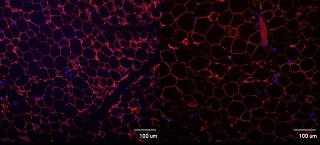 |
| When scientists silenced the "obesity gene" in mice, fat cells were 50% smaller (left vs. right).--Courtesy of UBC |
By silencing a gene which encodes the protein 14-3-3zeta, scientists at the University of British Columbia say they were able to halve the amount of white fat in mice, possibly opening the door to a new approach to fighting obesity.
The researchers have spent much of the past four years focused on this target after routinely finding it in the fat tissue of obese people. Mice bred with high concentrations of 14-3-3zeta protein weighed in at an average weight that was 22% higher than normal mice and silencing the gene triggered rapid weight loss.
"People gain fat in two ways--through the multiplication of their fat cells, and through the expansion of individual fat cells," said Gareth Lim, a postdoctoral fellow in UBC's Life Sciences Institute. "This protein affects both the number of cells and how big they are, by playing a role in the growth cycle of these cells."
The basic idea here is that the right treatment could either spur weight loss or prevent weight gain in people at high risk of becoming overweight--the holy grail in obesity R&D. But coming up with an effective weight drug has tantalized and frustrated drug developers for years as many developers considered the enormous commercial prospects of any new drug that would help people win the battle of the bulge. Regulators maintain a high bar on safety, though, making any new clinical forays into weight a risky endeavor for any company.
Even under the best of circumstances, any new drug studies regarding an obesity gene would require years of expensive clinical research.
The researchers note that obesity is linked with a host of common maladies like diabetes and hypertension, conditions which eat up $2 trillion in costs to society each year. And obesity rates have been accelerating in recent years in the U.S.
The UBC team's work was published in Nature Communications.
- here's the release
- read the research article